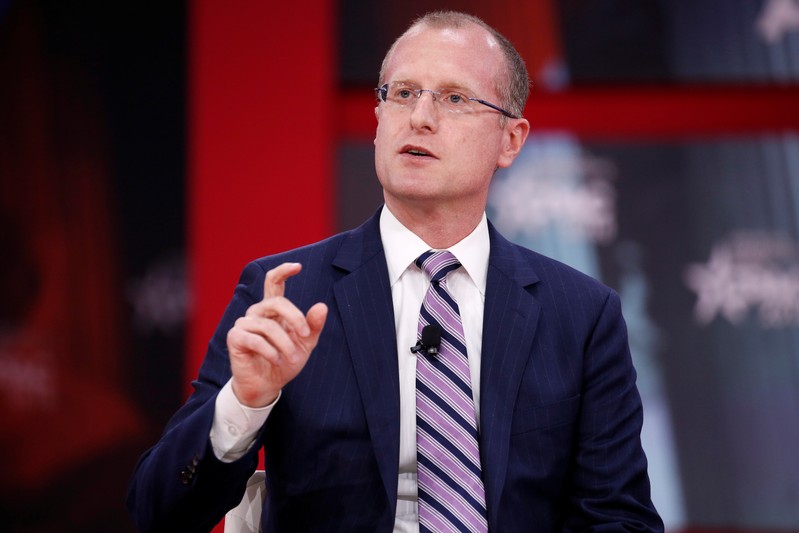
Commissioner Brendan Carr of the Federal Communications Commission speaks at the Conservative Political Action Conference (CPAC) at National Harbor, Maryland, U.S., February 23, 2018. REUTERS/Joshua Roberts
October 23, 2018
By David Shepardson
WASHINGTON (Reuters) – The U.S. Federal Communications Commission voted unanimously on Tuesday to open additional spectrum to the growing number of connected devices as it studies whether to tap another largely unused block.
The telecommunications regulator proposed making up to 1200 megahertz of spectrum available for use by unlicensed devices in the 6 GHz band, or five times the current spectrum available. Unlicensed devices include things like Wi-Fi routers, connected home appliances, baby monitors, fitness trackers, garage door openers and cordless landline phones.
“We need more spectrum to connect billions of new devices to the Internet,” said FCC Commissioner Brendan Carr, a Republican.
Carr said Wi-Fi, which uses unlicensed spectrum, is critical to U.S. communication networks, citing a recent study that two-thirds of data among mobile phone users with unlimited data still travels on Wi-Fi networks.
Total U.S. internet traffic is expected to jump by 300 percent between 2016 and 2021, and Wi-Fi networks will carry about half the traffic.
A group representing major utility confirms raised concerns, noting that electric, gas and water companies use the 6 GHz spectrum band for communications networks. The Utilities Technology Council said the “risk of radio frequency interference to utilities’ mission-critical networks outweighs the potential benefits from unlicensed use of the band.”
The FCC also voted to make changes in how it auctions licenses in the 3.5 GHz band – a key spectrum needed to deploy next-generation 5G networks.
The FCC voted 3-1 to issue licenses by counties rather than smaller census tracks.
FCC Commissioner Mike O’Rielly, a Republican, said the new rules will ensure the spectrum can be used for large-scale deployments of 5G or mobile networks and not just small-scale, fixed networks. He said the new rules will ensure a competitive marketplace and place “the nation’s spectrum into the hands of those who maximize its use for Americans.”
But FCC Commissioner Jessica Rosenworcel, a Democrat, argued the proposal makes it harder for smaller players to experiment. “This is like being at the dawn of the Uber age and doubling down on taxi medallions,” she said.
The FCC continues to debate if it should tap the 5.9 GHz unlicensed spectrum band for wireless devices. Automakers want to use the spectrum to allow cars to “talk” to one another to avoid crashes.
Last week, a trade group representing major cable and content companies including Comcast Corp, Charter Communications Inc and Twenty-First Century Fox Inc urged the FCC to take a “fresh look” at the 5.9 GHz spectrum, saying the current effort had “clearly failed” since the band had been largely unused by automakers for two decades.
FCC Chairman Ajit Pai, a Republican, said on Tuesday that results from the first phase of testing over whether 5.9 GHz spectrum can be shared will be released soon.
(Reporting by David Shepardson; Editing by Paul Simao)
